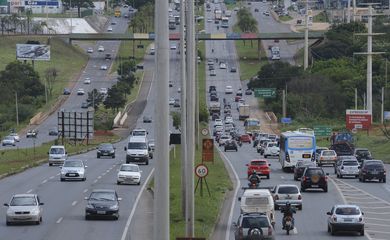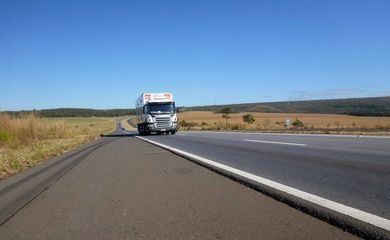More than half of Brazil's road network has problems


According to 2015 CNT's research in highways, a total of 57,3% of the road network has problems

A study released today (Nov. 4) by the National Transport Confederation (CNT in the original acronym) shows that 57.3% of the approximately 100,000 km of roads analyzed have presented some sort of problems on paving, signage, or geometry. Other 42.7% of the road network were rated as good or excellent, thus they presented "proper safety and performance conditions."
In the 57.3%, 6.3% are labeled as terrible, 16.1% poor, and 34.9%, regular. The users are mainly confronted with geometry (painting) problems, occurring in 77.2% of the roads analyzed. The rate is followed by signage problems (51.4%) and paving (48.6%).
Road problems have incurred losses for both the users and the government: "R$ 46.8 billion [$12.4 billion] were lost in 2014 due to paving problems. R$12.3 billion [$3.2 billion] were spent only on road accidents. If all the roads were good or excellent in 2015, we would also save 749 million liters of diesel fuel, saving R$2.1 billion [$557 million]. Not taking into account the benefits for the environment," said CNT's director Bruno Batista.
According to CNT's reports, only 12.4% of the national road network is paved, corresponding to 213,300 km of the 1.72 million km of the country's road network.
"One of the factors contributing the most to the poor condition of roads is the high number of two-lane roads. The absence of another lane increases the number of accidents," further declared Batista, reporting that 86.5% of the roads analyzed presented these characteristics.
Concessions
For Vander Costa, another CNT's director, the highway concessions to the private sector may be the most viable solution. According to him, $79.6 billion of investment is necessary to establish the standard in the entire road network. "There is also [spending on] death and disability pensions, or the SUS [Unified Public Health Care System]. All this leads us to conclude that investing in highways will result in savings for the government's coffers," said Costa.
According to Costa, the national and foreign private sector would be interested in investing in road transport. "We need only to stand securities for the capital coming to Brazil, by granting long-term contracts," concluded Costa.
The research was conducted in June and July 2015 by 20 CNT's staff groups.
Translated by Amarílis Anchieta
Fonte: More than half of Brazil's road network has problems



